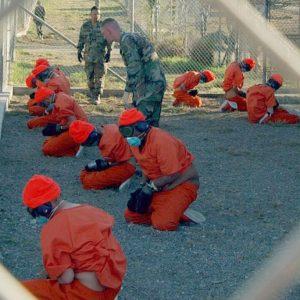“The military detention facility at Guantánamo Bay is a glaring, longstanding stain on the human rights record of the United States.”
— Amnesty International

By Shane T. McCoy, U.S. Navy, Jan. 11, 2002, Camp x-ray detainees. (Public Domain, commons.wikimedia.org/w/index.php?curid=774059)
Ridah Bin Saleh al-Yazidi was one of the first to arrive at the Guantánamo Bay military prison camp on January 11, 2002, captured as part of the U.S. “war on terror”. Over the 23 years of his imprisonment, Al-Yazidi was never charged. He was approved for release 15 years ago, and finally, on December 30, 2024, the Biden administration wrapped up an agreement with Tunisia for repatriation.
Al-Yazidi is among the 14 prisoners that Biden has released in these final days of his presidency, great news for these long-held detainees. They are some of the last of the 780 men who were shipped to Guantánamo under horrendous conditions as part of the Bush administration’s “war on terror.” There was no due process, and most of the 780 were never charged.
Today, 15 Muslim men are still detained at Guantánamo. Six are not charged with any crimes. Many were tortured by the U.S. government. And three of the remaining detainees have long been cleared for transfer to other countries, but they remain behind bars without charge or trial. It is unlikely that Biden will live up to his promise of closing the prison, although he is to be credited with reducing its population from 40 when he took office. Amnesty International has a letter-writing campaign to Biden demanding closure of the prison.
Guantánamo is just one of the costly aspects of the U.S.’s ill-conceived and deadly “war on terror”, which has certainly done more to increase terrorism than reduce it. Holding prisoners at Guantánamo is estimated to cost $13 million per prisoner per year for a total of more than $7 billion over two decades. Incalculable are the moral costs and to the U.S. reputation around the world.
War tax resisters have been among those protesting the prison over these 23 years, both through refusal to pay for torture and at visible public demonstrations. We played a small role in the 2005 founding of Witness Against Torture, whose photographs of public actions in orange jumpsuits and black hoods have become ubiquitous in stories related to Guantánamo. NWTRCC paid Catholic Worker cooks to provide our meals for our strategy conference in New York City in 2005. They were raising money to travel to Guantánamo Bay to awaken the public to the injustice and torture being done in our name. The trip led to the founding of WAT.
 Andy Worthington, a journalist and campaigner to close Guantánamo, tracks just about every detail of the illegal prison and the 780 detainees who have been held there. He promotes the Global Vigils to Close Guantánamo , cosponsored by many groups including Amnesty International, Center for Constitutional Rights, September 11 Families for Peaceful Tomorrows, World Can’t Wait, and more. Vigils are held the first Wednesday of each month in locations from London to Los Angeles, with a special day of action this Saturday, January 11, to demand final closure of the prison.
Andy Worthington, a journalist and campaigner to close Guantánamo, tracks just about every detail of the illegal prison and the 780 detainees who have been held there. He promotes the Global Vigils to Close Guantánamo , cosponsored by many groups including Amnesty International, Center for Constitutional Rights, September 11 Families for Peaceful Tomorrows, World Can’t Wait, and more. Vigils are held the first Wednesday of each month in locations from London to Los Angeles, with a special day of action this Saturday, January 11, to demand final closure of the prison.
For all these prisoners released from Guantánamo, beside the toll on their mental and physical health, most are sent to countries where they have limited connections, little support, and may face continued detention. Redirected taxes would be well spent by supporting the Guantánamo Survivors Fund, which raises funds to help former prisoners overcome at least the immediate hurdles.
—Post by Ruth Benn
One more thing: To mark the 23 years of illegal detention at Guantánamo, the Muslim Counterpublics Lab is holding a webinar on January 15, Migrants and Muslims at Guantanamo: A History of Demonization, Social Control and Resistance. The panel includes Guantanamo survivor Mansoor Adayfi among others.
